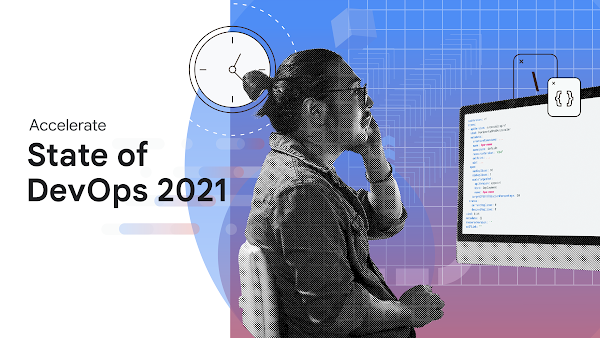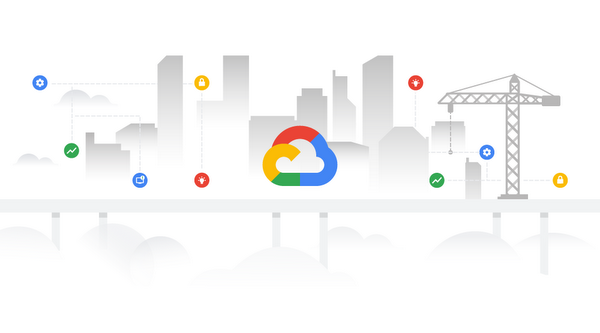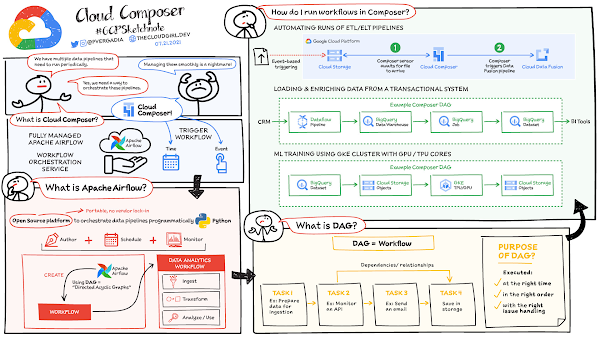DevOps & SRE
SODR_Hero
Over the past seven years, more than 32,000 professionals worldwide have taken part in the Accelerate State of DevOps reports, making it the largest and longest-running research of its kind. Year over year, the Accelerate State of DevOps reports provide data-driven industry insights that examine the capabilities and practices that drive software delivery as well as operational and organizational performance. That is why Google Cloud’s DevOps Research and Assessment (DORA) team is very excited to announce our 2021 Accelerate State of DevOps Report.
Our research continues to illustrate that excellence in software delivery and operational performance drives organizational performance in technology transformations. This year we also investigated the effects of SRE best practices, a secure software supply chain, quality documentation, and multicloud–all while gaining a deeper understanding of how this past year affected team’s culture and burnout.
Read below to find some of the new findings from this year’s report:
Software delivery performance metrics
Based on key findings from previous Accelerate State of DevOps reports, we again used four metrics to classify teams as elite, high, medium or low performers based on their software delivery: deployment frequency, lead time for changes, mean-time-to-restore, and change fail rate. This year we saw that elite performers continue to accelerate their pace of software delivery, increasing their lead time for changes from less than one day to less than one hour. Not only that, but elite performers deploy 973x more frequently than low performers, have a 6570x faster lead time to deploy, a 3x lower change failure rate, and an impressive 6570x faster time-to-recover from incidents when failure does happen. You read that right: compared to low performers, elite performers are continually able to empirically demonstrate organizational success with DevOps.
The fifth metric: from availability to reliability
Historically we have measured availability rather than reliability, but because availability is a specific focus of reliability engineering, we’ve expanded our measure to reliability so that availability, latency, performance, and scalability are more broadly represented. Specifically, we asked respondents to rate their ability to meet or exceed their reliability targets. We found that teams with varying degrees of delivery performance see better outcomes when they also prioritize operational performance.
2021 insights: the impact of reliability, COVID and secure software supply chains
In addition to measuring the impact of DevOps adoption on software delivery performance, this year’s DORA report also revealed many other new trends. Here’s a sampling.
1) A healthy team culture mitigates burnout during challenging times
Respondents who worked from home because of the pandemic experienced more burnout than those who stayed in the office (a small portion of our sample). Inclusive teams with a generative culture were half as likely to experience burnout during the COVID-19 pandemic.
2) The highest performers continue to raise the bar
For the first time, high and elite performers make up two-thirds of respondents–compared to the 2019 report where low and medium performers made up 56% of respondents. We can confidently say that as the industry continues to accelerate its adoption of DevOps principles teams see meaningful benefits as a result.
Extending from its core principles, Site Reliability Engineering (SRE) provides practical techniques, including the service level indicator/service level objective (SLI/SLO) metrics framework. The SRE framework offers definitions on practices and tooling that can enhance a team’s ability to consistently keep promises to their users. Teams that prioritize both delivery and operational excellence report the highest organizational performance.
To investigate this, we included operations questions in the survey for the first time this year. The evidence from the survey indicated teams who excel at modern operational practices are 1.4 times more likely to report greater software delivery and operational (SDO) performance, and 1.8 times more likely to report better business outcomes.
4) Cloud adoption continues to drive performance
Teams continue to move workloads to the cloud and those that leverage all five capabilities of cloud see increases in SDO performance, as well as in organizational performance. Multicloud adoption is also on the rise so that teams can leverage the unique capabilities of each provider. In fact, respondents who use hybrid or multicloud were 1.6 times more likely to exceed their organizational performance targets.
Security can no longer be an afterthought–it must be integrated throughout every stage of the software development lifecycle to build a secure software supply chain. Elite performers who met or exceeded their reliability targets were twice as likely to have shifted their security practices left, i.e., implemented security practices earlier on in the software development lifecycle, and deliver reliable software quickly, and safely.
6) Good documentation is foundational for successfully implementing DevOps capabilities
For the first time, we measured the quality of internal documentation and its effect on other capabilities and practices. We found documentation is foundational for successfully implementing DevOps capabilities. Teams with high-quality documentation are 3.8x more likely to implement security best practices and 2.5x more likely to fully leverage the cloud to its fullest potential.
Introducing the DevOps Awards
Now that we have shared some of our DevOps best practices with you, we would love to hear about how you are transforming your organization with DevOps. In our first annual DevOps Awards, we’ll recognize Google Cloud customers that have improved their deployment frequency, successfully shifted left on security, or improved their change fail rate percentage, etc. Tell us about the positive impact that DevOps has had on your teams, customers, and organization. Enter your submission here today!
Thanks to everyone who took our 2021 survey. We hope this Accelerate State of DevOps report helps organizations of all sizes, industries, and regions improve their DevOps capabilities, and we look forward to hearing your thoughts and feedback. To learn more about the report and implementing DevOps with Google cloud, check out the following resources:
- Download the report
- To find out more about how your organization stacks up against others in your industry, take the DevOps Quick Check
- For customized DevOps solutions for your organization, check out our newly launched CAMP website
- Learn more about DevOps capabilities for elite performance









